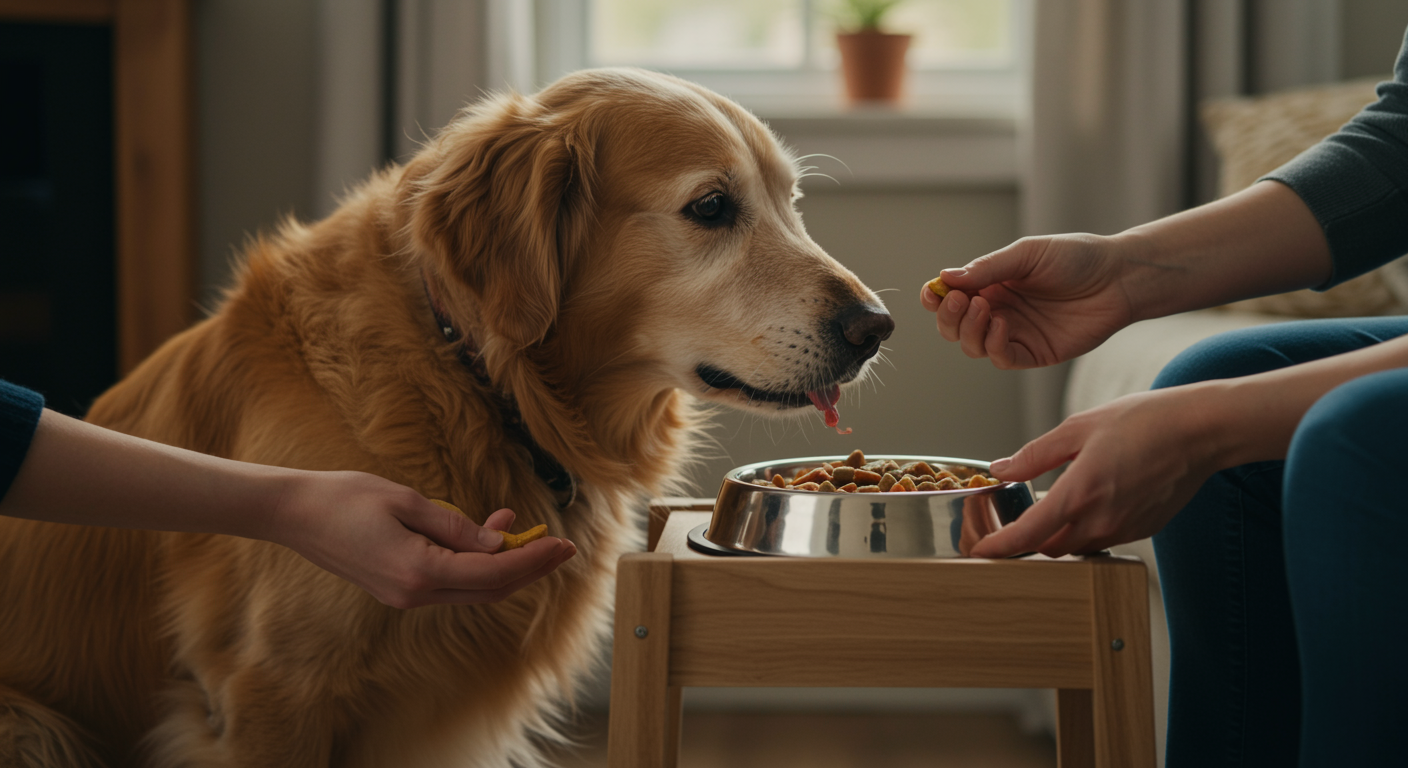Appetite changes in senior Golden Retrievers can be concerning for families who want to ensure their beloved companions receive adequate nutrition for maintaining health and quality of life. Understanding the various factors that can affect appetite in aging dogs helps families develop effective strategies for encouraging healthy eating habits and supporting nutritional well-being.
Senior Golden Retrievers may experience decreased appetite due to various factors including sensory changes, dental discomfort, medication effects, or simply reduced metabolic needs. Creating appealing meal experiences and addressing underlying causes can significantly improve food intake while maintaining the pleasure and social aspects of mealtime.
Successful appetite stimulation requires a comprehensive approach that addresses both physical and emotional factors affecting eating behavior, while ensuring that nutritional needs are met through creative presentation, environmental optimization, and sometimes medical intervention when appropriate.
Understanding Appetite Changes in Senior Dogs
Physical Factors Affecting Appetite
Sensory Changes and Food Appeal
Senior Golden Retrievers commonly experience decreased sense of smell, which significantly impacts appetite since dogs rely heavily on scent to identify and become interested in food. This reduced olfactory function can make previously appealing foods seem less interesting or appetizing.
Taste sensitivity may also diminish with age, affecting the dog’s ability to enjoy subtle flavors and potentially reducing enthusiasm for foods that were once highly preferred. These sensory changes require creative approaches to enhance food appeal.
Vision changes that sometimes accompany aging can affect how dogs perceive and approach their food, making presentation and feeding environment important factors in stimulating appetite and encouraging eating.
Dental Health and Eating Comfort
Dental issues common in senior dogs, including tooth loss, gum disease, or oral pain, can significantly impact appetite by making eating uncomfortable or difficult. Dogs may avoid food to prevent discomfort rather than indicating lack of hunger.
Changes in jaw strength and chewing ability may make certain food textures less appealing or accessible, requiring modifications in food consistency to maintain eating comfort and encourage consumption.
Understanding the connection between oral comfort and appetite helps identify when dental evaluation might be necessary to address underlying causes of eating reluctance.
Health-Related Appetite Factors
Medication Effects on Eating
Many medications commonly prescribed for senior dogs can affect appetite through various mechanisms including nausea, taste changes, or digestive upset that makes eating less appealing or comfortable.
Understanding potential medication side effects helps families distinguish between medication-related appetite changes and other health issues while working with veterinary professionals to optimize treatment approaches.
Timing of medications relative to meals can sometimes be adjusted to minimize appetite-suppressing effects while maintaining therapeutic benefits for underlying health conditions.
Underlying Health Conditions
Various health conditions common in senior dogs can affect appetite through discomfort, nausea, or metabolic changes that reduce interest in food or make eating less pleasant.
Conditions such as kidney disease, liver problems, or gastrointestinal issues may require specific dietary modifications and appetite stimulation strategies tailored to the underlying health challenge.
Understanding the relationship between health conditions and appetite helps guide appropriate interventions while ensuring that appetite stimulation approaches support rather than compromise overall health management.
Environmental and Presentation Strategies
Optimizing Feeding Environment
Creating Comfortable Dining Spaces
Senior Golden Retrievers benefit from quiet, comfortable feeding areas that minimize distractions and stress while allowing them to eat at their own pace without pressure or competition from other pets.
Elevated feeding stations can improve eating comfort for dogs with arthritis or neck problems, making food more accessible while reducing strain during meals.
Temperature control in feeding areas helps ensure comfort during meals, as senior dogs may be more sensitive to environmental conditions that could affect their willingness to eat.
Reducing Mealtime Stress
Consistent feeding routines and locations help reduce anxiety around mealtime while creating positive associations with food and eating that can stimulate appetite.
Removing competition from other pets or household activity during feeding times allows senior dogs to focus on eating without feeling rushed or stressed about protecting their food.
Creating calm, positive atmospheres during meals through gentle encouragement and patient presence can help anxious or reluctant eaters feel more comfortable approaching their food.
Appetite Stimulation Techniques Guide
| Technique | Implementation | Benefits | Considerations | Best For |
|---|---|---|---|---|
| Food Warming | Heat to body temperature | Enhanced aroma and palatability | Check temperature, avoid overheating | Dogs with reduced smell |
| Texture Modification | Soften with broth or water | Easier chewing, improved comfort | Monitor for digestive changes | Dogs with dental issues |
| Flavor Enhancement | Add safe, appealing ingredients | Increased interest and variety | Introduce gradually, ensure safety | Picky eaters |
| Hand Feeding | Offer food by hand | Personal attention, encouragement | Requires time and patience | Anxious or reluctant eaters |
| Multiple Small Meals | 3-4 smaller portions daily | Reduced meal burden, sustained interest | Requires schedule coordination | Dogs with decreased capacity |
| Interactive Feeding | Puzzle bowls, engagement activities | Mental stimulation, extended interest | Choose appropriate difficulty | Dogs needing enrichment |
Food Enhancement and Preparation Methods
Aroma and Flavor Enhancement
Natural Appetite Stimulants
Warming food slightly can significantly enhance its aroma, making it more appealing to senior dogs with diminished sense of smell. This simple technique can transform ordinary meals into more enticing experiences.
Adding small amounts of warm, low-sodium broth or bone broth can enhance both aroma and flavor while providing additional moisture that many senior dogs find appealing and beneficial.
Fresh ingredients such as small amounts of cooked chicken, fish, or safe vegetables can provide natural flavor enhancement while adding nutritional variety and sensory interest.
Safe Flavor Additions
Understanding which ingredients are safe and appealing for dogs helps guide flavor enhancement while avoiding foods that could be harmful or cause digestive upset.
Rotating different safe flavor enhancers prevents habituation while providing variety that can maintain interest in meals over time.
Gradual introduction of new flavors allows for assessment of individual preferences and tolerance while building a repertoire of successful appetite stimulation techniques.
Texture and Presentation Modifications
Adapting Food Consistency
Softening dry kibble with warm water or broth creates a more comfortable eating experience for dogs with dental sensitivity while enhancing aroma and digestibility.
Mixing wet and dry foods provides textural variety while combining the benefits of both food types for improved palatability and nutritional balance.
Pureed or finely chopped additions can provide flavor enhancement without requiring difficult chewing, making meals more accessible for dogs with significant dental limitations.
Creative Food Presentation
While dogs primarily rely on scent and taste, varying food presentation through different bowl types, scattered feeding, or layered arrangements can provide interest and stimulation.
Interactive feeding methods such as puzzle bowls or food-dispensing toys can make mealtime more engaging while slowing eating pace for better digestion.
Understanding that novelty can stimulate interest helps guide creative presentation approaches that maintain appeal while supporting healthy eating habits.
Medical and Therapeutic Interventions
Appetite Stimulating Medications
Prescription Options
When behavioral and environmental approaches aren’t sufficient, veterinary professionals may prescribe appetite-stimulating medications that can help restore interest in food.
Understanding how these medications work and their potential side effects helps families make informed decisions about medical intervention for appetite problems.
Proper administration and monitoring of appetite-stimulating medications ensures maximum benefit while minimizing risks or adverse effects.
Natural Supplements
Some natural supplements and herbs may help stimulate appetite in senior dogs, though these should always be used under veterinary guidance to ensure safety and appropriateness.
Understanding the difference between proven appetite stimulants and unsubstantiated claims helps families make informed choices about supplement use.
Integration of natural approaches with conventional treatments can provide comprehensive support for appetite stimulation while maintaining safety.
Addressing Underlying Causes
Dental Care and Oral Health
Professional dental evaluation and treatment can significantly improve appetite when dental pain or discomfort is contributing to eating reluctance.
Regular dental care and oral health maintenance help prevent dental issues that could affect appetite while supporting overall health and comfort.
Understanding signs of dental problems helps families recognize when professional evaluation might be necessary to address appetite issues.
Medical Evaluation and Treatment
Comprehensive medical evaluation can identify underlying health conditions that may be affecting appetite, allowing for targeted treatment that addresses root causes.
Blood work and other diagnostic tests can reveal metabolic or systemic issues that require specific treatment approaches to restore normal appetite.
Understanding when appetite changes warrant medical investigation helps ensure appropriate care while avoiding unnecessary anxiety about normal aging changes.
Nutritional Support Strategies
Ensuring Adequate Intake
Monitoring and Assessment
Regular monitoring of food intake, body weight, and body condition helps assess the effectiveness of appetite stimulation efforts while identifying when additional intervention may be needed.
Understanding normal versus concerning changes in eating patterns helps families respond appropriately to appetite fluctuations while maintaining nutritional support.
Documentation of successful strategies and preferred foods helps build effective approaches while providing valuable information for veterinary consultations.
Nutritional Density Optimization
When appetite is reduced, ensuring that consumed food provides maximum nutritional benefit becomes important for maintaining health despite decreased intake.
High-quality, nutrient-dense foods can provide better nutrition per bite, helping meet nutritional needs even when total food consumption is reduced.
Understanding caloric density and nutritional content helps guide food selection that supports health while working within appetite limitations.
Hydration Support
Moisture Integration
Incorporating additional moisture into meals through broths, gravies, or wet food mixing provides hydration benefits while potentially enhancing palatability and appeal.
Understanding the connection between hydration and appetite helps guide meal enhancement strategies that support both fluid intake and eating interest.
Creative approaches to combining nutrition and hydration can help address multiple needs simultaneously while making meals more appealing.
Behavioral and Psychological Approaches
Creating Positive Associations
Mealtime Bonding
Incorporating gentle interaction and attention during meal preparation and feeding can create positive associations that enhance appetite through emotional connection.
Hand feeding or staying nearby during meals can provide comfort and encouragement for senior dogs who may feel vulnerable or anxious about eating.
Understanding individual preferences for social interaction during eating helps tailor approaches that enhance rather than interfere with comfortable dining.
Routine and Predictability
Consistent meal timing creates anticipation and routine that many senior dogs find comforting and appetite-stimulating through positive expectation.
Understanding the importance of routine in senior dog care helps guide feeding schedule development that supports both appetite and overall well-being.
Flexibility within routine allows for adaptation to individual needs while maintaining the security and predictability that supports appetite.
Addressing Anxiety and Stress
Stress Reduction Techniques
Identifying and addressing sources of stress or anxiety that may be affecting appetite helps create conditions that support natural eating behaviors and interest in food.
Environmental modifications that reduce stress and create calm, secure feeding conditions can significantly improve appetite in anxious or sensitive senior dogs.
Understanding the relationship between emotional well-being and appetite helps guide comprehensive approaches that address both psychological and physical factors.
Special Circumstances and Adaptations
Post-Illness Recovery
Appetite Recovery Strategies
Senior dogs recovering from illness or medical procedures may require special attention to appetite stimulation as part of their recovery process.
Understanding that appetite may return gradually helps maintain patience while providing consistent support and encouragement during recovery periods.
Adapting appetite stimulation techniques for specific health conditions ensures that approaches support rather than interfere with medical treatment and recovery.
Medication-Related Appetite Issues
Managing Side Effects
When medications cause appetite suppression, working with veterinary professionals to adjust timing, dosing, or formulations may help minimize effects on eating.
Understanding which medications commonly affect appetite helps families prepare for potential challenges while maintaining necessary medical treatments.
Coordinating appetite stimulation efforts with medication schedules can help optimize both therapeutic benefits and nutritional intake.
Long-Term Success and Maintenance
Sustainable Strategies
Building Effective Routines
Developing sustainable appetite stimulation routines that can be maintained consistently helps ensure long-term success in supporting healthy eating habits.
Understanding family capabilities and time constraints helps create realistic approaches that can be sustained over time without causing stress for caregivers or dogs.
Creating backup strategies ensures that appetite stimulation can continue even when primary approaches aren’t available due to changing circumstances.
Monitoring and Adaptation
Ongoing Assessment
Regular evaluation of appetite stimulation effectiveness helps identify successful strategies while recognizing when modifications or additional interventions may be needed.
Understanding that senior dogs’ needs may change over time helps maintain flexibility in approaches while continuing to support healthy eating habits.
Communication with veterinary professionals about appetite patterns and concerns ensures appropriate medical support while maintaining optimal nutritional status.
Quality of Life Considerations
Balancing Intervention and Acceptance
Realistic Expectations
Understanding normal appetite changes associated with aging helps distinguish between concerning appetite loss and natural adjustments in food intake that may occur with age.
Balancing efforts to stimulate appetite with acceptance of individual preferences and capabilities helps maintain quality of life while supporting nutritional needs.
Recognizing when appetite changes may indicate more serious health issues helps ensure appropriate medical evaluation while avoiding unnecessary anxiety about normal variations.
Celebrating Success
Positive Reinforcement
Acknowledging and celebrating successful eating experiences helps maintain positive associations with food while encouraging continued appetite and interest in meals.
Understanding that small improvements in appetite represent significant progress helps maintain motivation for continued appetite stimulation efforts.
Creating enjoyable mealtime experiences that go beyond simple nutrition helps maintain the pleasure and social aspects of eating that contribute to overall quality of life.
Stimulating appetite in senior Golden Retrievers requires patience, creativity, and understanding of the various factors that can affect eating behavior in aging dogs. Through comprehensive approaches that address physical comfort, environmental factors, and emotional well-being, families can help maintain healthy eating habits while preserving the enjoyment of mealtime.
Success in appetite stimulation comes from recognizing that eating represents both physical necessity and emotional pleasure, requiring approaches that address both aspects for optimal outcomes. With consistent effort and appropriate support, most senior Golden Retrievers can maintain adequate nutrition while continuing to find pleasure and satisfaction in their meals.
The investment in appetite stimulation strategies pays dividends in improved nutrition, maintained body condition, and the continued enjoyment of one of life’s fundamental pleasures throughout the senior years, supporting overall health and happiness during this important life stage.





Comments
Pingback: Hydration Tips for Senior Golden Retrievers: Encouraging Water Intake